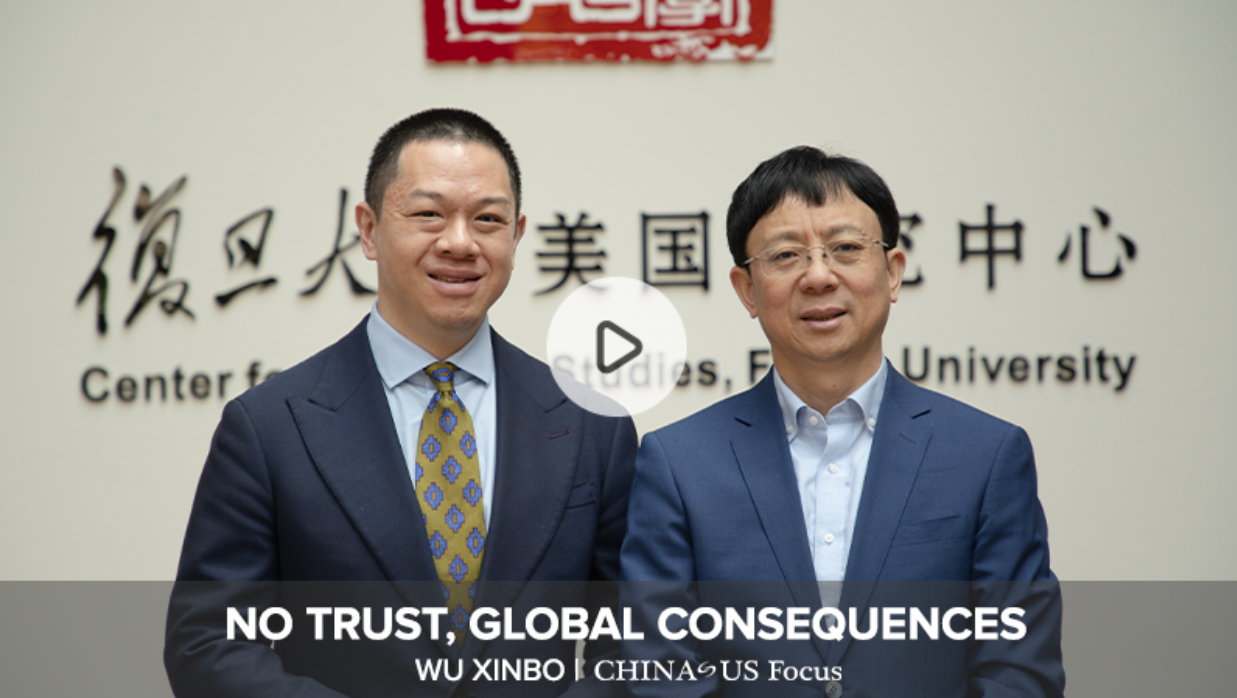In this interview, Fudan University’s Professor Wu Xinbo warns that U.S.-China relations have worsened across political, economic, and security fronts since 2019, emphasizing that mutual trust is now near zero and urging a mindset shift toward cooperation in an increasingly interconnected world.
Click to watch the interview with Professor Wu Xinbo
James Chau:
Professor Wu Xinbo, thanks very much for having me here on campus at Fudan University. Let's go back to six years ago when we spoke in 2019, you described the U.S.-China relationship then as one of a structural dilemma due to the parallel structural disputes on the economic security and also political fronts. Has that dilemma necessarily deepened today?
Wu Xinbo:
Well, the answer is yes, as we have seen over the last several years. On the economic front, I mean, there have been more frictions on the security front, we see the rising risk of some conflict between two countries in the Taiwan Strait or in South China Sea. And politically, I mean, over the last several years, Biden's vision had promoted the narrative of democracy versus authoritarian. So we can see this kind of gap between two countries — in political, economic and security realms — has deepened and widened. So I think we are moving in a very much different direction compared with, you know, the first 30 years before maybe 2019, when we talk about this issue.
James Chau:
When we look at the trade war now, we can see a broader set of countries and industries and larger tariffs involved compared to the first Trump administration. What do you think China has learned from its interactions with President Trump from six years ago compared to today, and what feels different about the Trump approach this time around?
Wu Xinbo:
Well, when it comes to the utility of tariff as an instrument, I think Trump has been very consistent compared with his first term. He still strongly believes that tariff is a very useful instrument in pushing his domestic and foreign policy agenda. So this is why in his second term, he basically used this leverage in a much broader context, not just touching on China or several countries, but almost to everybody in the world. So that's one thing. And second, what are the differences? Is that if you look at approaches to China in his first term, that was a gradual, escalatory approach, step by step, you know, to raise attention on China, but this time is very much different. Within a matter of 10 days, the tariff imposed on China went from 20% to now maybe 120%. This is a very drastic pressure on China that shows a very different tactic as compared with his first term.
James Chau:
We're speaking here at the Center for American Studies, which was established all the way back in 1985, so it's almost as old as the bilateral relationship itself. With all that insight, you always speak about the mutual issue being trust. Do you think that mutual trust is still salvageable in not only a changing bilateral relationship, but also a changing world?
Wu Xinbo:
Well, I think the mutual trust between China-U.S. is at best zero at the moment, or even negative because of what happened in the last seven or eight years since Trump's first administration. At the same time, we have seen the growing suspicion, mistrust, and even hostility between the two countries and two societies. Assume this is a very unfortunate development, not only for our two countries, but for the rest of the world, because here are the two largest economies in the world, here are the two major countries with nuclear arsenals. So if we are going to head to a conflict because of the growing mistrust, misjudgment, and even hostility, the entire world will suffer from it.
James Chau:
We often hear scholars like yourself speaking of strategic competition, but I want to ask you about strategic patience. What does that look like to you?
Wu Xinbo:
Well, strategic patience is something like a luxury these days, because politicians are becoming more and more impatient. I mean, if you look to Trump, he wants to get something, you know, not in one year, but one month or one week, or even 24 hours. So, I think you know this is going to be a common phenomenon for many country leaders, strategic patience is not the luxury they can count on when dealing with each other, and this is especially in the case when you know President Trump thinks about his policy, his political agenda, in a very short time frame.
James Chau:
Let's look at the world as a whole. We're obviously moving into a period of transition and uncertainty. What are the qualities that we need, emotionally, intellectually, and otherwise, that we must cultivate now to prepare for this different kind of world that we're heading towards?
Wu Xinbo:
Well, this is a good question. I don't think it's a policy issue. It is really an issue related to our mindset and wisdom. I mean, today we need to change our way of thinking. We should not, you know, confine our thinking to national boundaries. We should not think about relations with other countries in a zero-sum perspective, because we are living in a world that we are more and more subject to the influence coming from other countries. And also, you know, you cannot imagine that a single country, no matter how powerful you are, you know, you just enjoy your prosperity and security without taking into consideration other actors. That is impossible. So I think we need, we really need to think beyond national boundaries. We really need to think about win-win, you know, relations with other countries. I think that's key to deal with many, many policy challenges.

